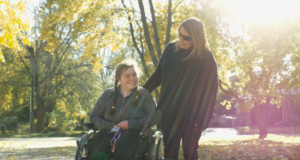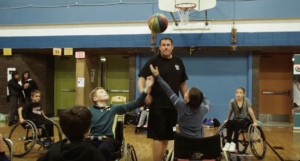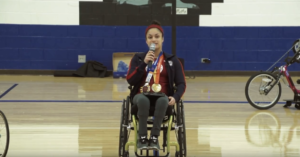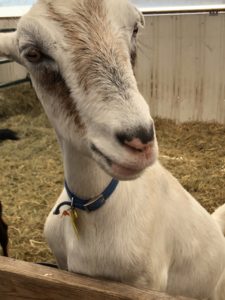Can your dog read Braille?
October 20, 2018 • 10 Comments • Posted in blindness, Braille, guide dogs, questions kids ask, Seeing Eye dogs, travel, visiting schools, Writing for ChildrenWhitney and I took a commuter train to Deerfield, Illinois Thursday to talk with third graders at Wilmot Elementary about what it’s like to be blind and get around with a Seeing Eye dog.
I started by explaining the three rules Wilmot students should keep in mind if they happen to see a guide dog with a harness on: don’t pet the dog, don’t feed the dog, and don’t call out the dog’s name. “Those things can distract a Seeing Eye dog,” I told them. “It’d be like if someone nudged you or kept calling your name wile you were working on your spelling words at school. You wouldn’t be able to concentrate on your work.”
And then I suggested we come up with a fake name for Whitney. “We’re going to be here at your school for a while today, and you might want to say hello if you see us in the hallway,” I said, explaining that if they use my Seeing Eye dog’s fake name to say hello, Whitney wouldn’t look their way and get distracted from her work — she wouldn’t realize they were talking to her.
I asked the kids what their principal’s name was. “Mrs. Brett!” they called out. “Does anyone know Mrs. Brett’s first name?” I asked. “I know! It’s Ellen!” one called out. “No, Eileen!” The entire class erupted for a short minute before it finally was decided. The kids would call Whitney by her Wilmot code name: Eileen.
And then came the questions:
- How do you know what you’re wearing?
- How do you drive?
- What if you’re at home and you lose something and you can’t remember where you put it?
- If you’re blind, how can you teach?
- Can your dog read Braille?
- Do you ever even get into a car?
- How do you know what you’re eating?
- How does it feel being blind?
- When you’re at home, how do you know where your dog is?
- If you’re blind, is it easier to fall asleep when you go to bed, or is it harder to go to sleep when you go to bed?
I had to think about that last question a long while. “When you’re blind, you have to think a lot all day,” I finally answered, describing how we remember which colors match — and which ones don’t — as we get dressed in the morning, picture where we’re going, map out a route in our heads, listen at intersections to determine if it’s safe to cross, count the “dings” on the elevator to know what floor we’re on, make sure to hear the announcement on the train so we get off at the right stop. “All that thinking, and then having such fun with all you guys, I’ll be pretty tired by the time we get home,” I said. “For tonight, at least, it’s going to be easy to fall asleep.”
And you know what? I was right.


 Schools are instrumental in breaking down barriers, fears and misunderstanding about disabilities. By celebrating and enlightening kids, school becomes the change agent the world needs to include and accept children with disabilities in every aspect of life.
Schools are instrumental in breaking down barriers, fears and misunderstanding about disabilities. By celebrating and enlightening kids, school becomes the change agent the world needs to include and accept children with disabilities in every aspect of life.



